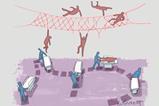To ensure the success of primary care networks, policy makers must act swiftly to address early problems and ensure networks feel truly owned and co-designed by GPs, says RCGP chair Professor Martin Marshall

Primary care networks are potentially transformational – they can improve access to a wider range of patient services and enable better population health management. To succeed, the national implementation framework must be sensitive and flexible to the challenges facing general practice.
Networks are still in their infancy and are extremely fragile. To safeguard success, policy makers must act swiftly to address early problems and ensure networks feel truly owned and co-designed by GPs.
General practice in England is facing severe workforce and workload challenges and, consequently, many practices have no capacity to deliver large-scale organisational change at the pace currently expected.
To help understand the barriers and enablers of success, we interviewed GPs, practice managers, clinical directors and the RCGP’s own primary care advisers who are supporting the development of networks.
Three key themes emerged from this work:
Building relationships and buy-in is essential but challenging in the current climate:
- Goodwill and trust in national policy initiatives is low because of successive NHS restructures. Policy imperatives have unintentionally fostered negativity, for example by forcing successful and struggling practices into networks together. It’s not that the rationale was flawed, it’s that there was insufficient engagement with the sector to get buy-in.
- Local leadership is fragmented. With multiple partners, and no single decision-maker, it can be challenging to get consensus or committed resources from practices. One clinical director said his PCN is working with a subset of practices to employ a clinical pharmacist as not all practices would support the post. He hoped this would prove the value of the post and eventually secure buy-in from all practices.
- There are doubts that PCNs will genuinely improve patient care and reduce GP workload. Some GPs feel they are investing time into PCNs with little return while the multi-site multi-professional teams may not be compatible with the principle of relational continuity.
There is insufficient knowhow and capacity to drive transformational change:
- Clinical directors have just over a day a week to deliver a large number of priorities while, as clinicians, many are not yet skilled in the practice of change management. Interviewees described offers of support and guidance as coming thick and fast but with little coordination or way of knowing what is useful.
- More established roles, such as pharmacists and physiotherapists, are welcomed, but questions exist over attracting recruits. Multi-site working may undermine a sense of team and job satisfaction could suffer if these professionals are given lower-level work from across practices rather than holding the whole caseload for a practice.
- Some new roles are untested. Primary care-based physician associates, for example, are perceived by some as a cheap role substitute for GPs requiring considerable supervision.
The requirements placed on PCNs are perceived as too prescriptive and inflexible:
- PCN maturity differs greatly and this affects readiness to deliver. Some mature networks are ready to introduce MDT roles where funding is not yet available; others, starting from scratch, need more time to develop relationships and trust, and are becoming disheartened as they fall behind.
- National PCN funding is unresponsive to local need. Some PCNs obtain resources from local federations and super-partnerships, but others are expected to deliver the same work within just a clinical director’s time.
A key learning is that PCNs must be given time, space and capacity to build the trust and goodwill necessary to succeed. Networks cannot be imposed by contractual diktat; they need to be co-designed by local GPs to generate a sense of ownership within the sector. Many PCNs are still very fragile and if too much is asked of them too soon they will break.
The national service specifications, currently out for consultation, do not respond to this and are not feasible in the current environment.
Further consultation with the profession will give NHS England the time to work with the sector to develop specifications that are responsive to different contexts and work for everyone and will importantly give PCNs the time they need to strengthen their relationships and recruit and develop the beginnings of their new multidisciplinary teams.






























1 Readers' comment